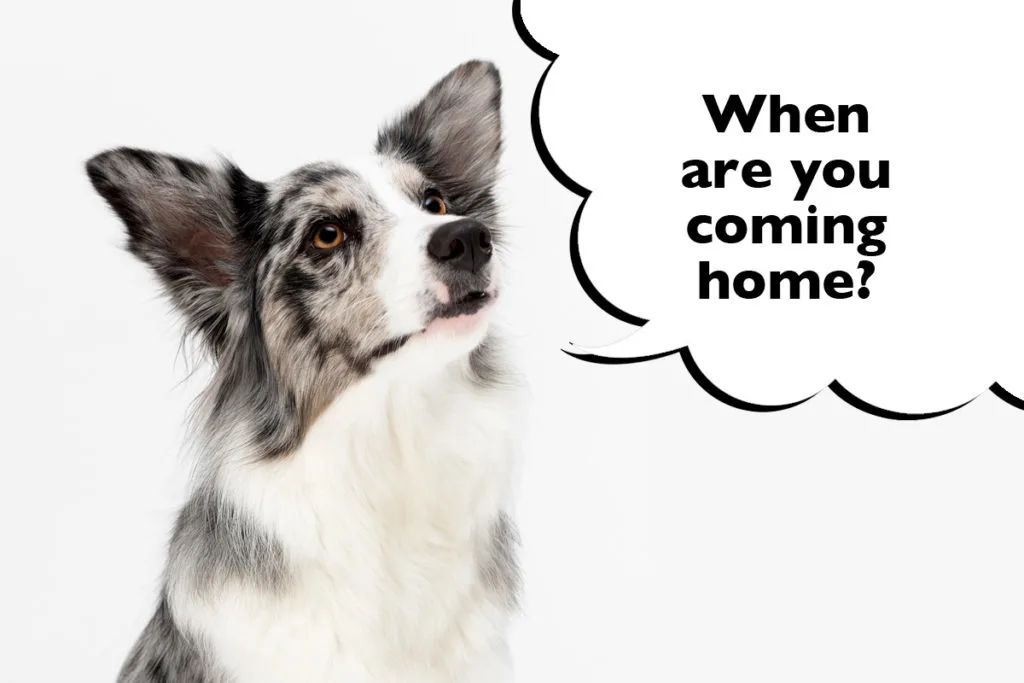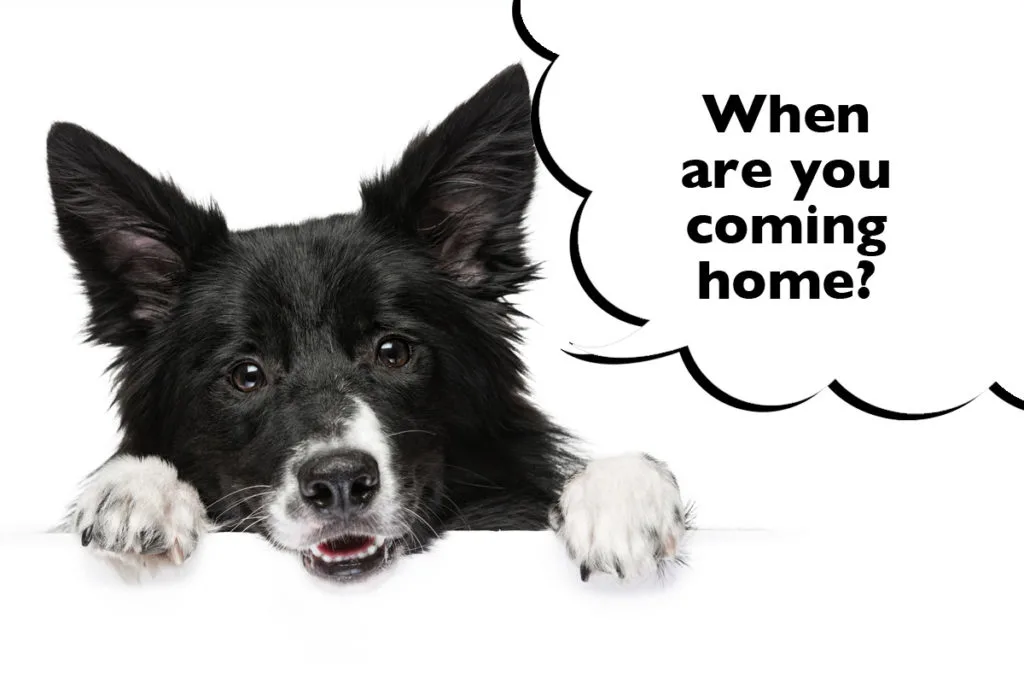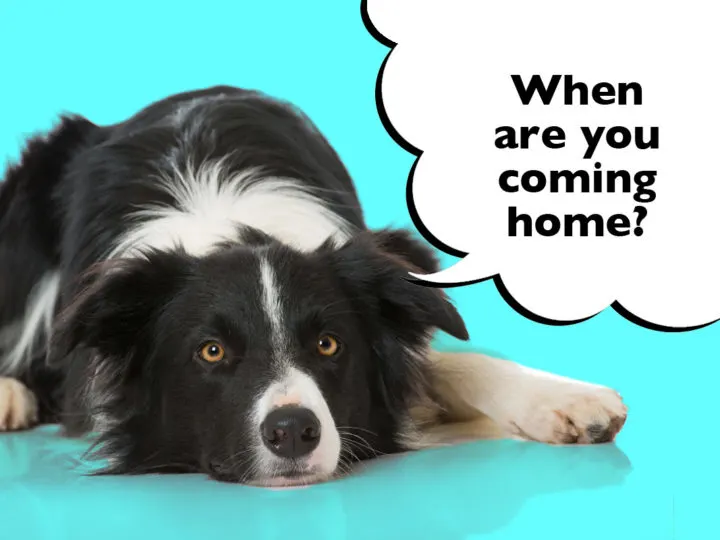Is your Border Collie struggling to cope when you go out of the house? Maybe they’re showing behavioural problems or being destructive when you’re not there? Here’s everything you need to know about whether Border Collies get separation anxiety.
Do Border Collies Get Separation Anxiety? Yes, Border Collies are prone to getting separation anxiety. They’re the smartest dog breed, and their high intelligence levels mean they need lots of mental stimulation. If they’re left alone too long, they can quickly show signs of separation anxiety.
Read on to find out why Border Collies are so prone to separation anxiety, what symptoms to look out for when you come back, and what you can do to help your Border Collie feel more reassured when home alone.
Never use the advice in this article as a substitute for professional veterinary advice or treatment. I am NOT a Vet, qualified dog trainer or dog behaviourist. This article is based on research, personal opinion and experience of owning dogs over the last 12+ years.
What Is Separation Anxiety In Border Collies?
Border Collies can easily get bored, frustrated and lonely when you’re not with them. These are all key factors for them developing separation anxiety.
After all, they’ve been bred for centuries to work closely with their owners herding livestock.
This requires a strong bond and connection between you, which can make it difficult for your Border Collie to feel happy and cope when you’re not you there.
In some cases, the symptoms of anxiety and distress can be severe along with other destructive and behavioral problems.
How Do I Know If My Border Collie Has Separation Anxiety?
If your Border Collie shows any of these behaviours when they’re left on their own, then it could be that they’ve got separation anxiety:
Vocalising Excessively
- Barking
- Howling
- Crying
- Whining
Destroying Things
- Ripping up their toys
- Chewing on furniture
- Shredding clothes, tissues, tea towels etc
Damaging Things
- Scratching at walls and doors trying to escape
Potty Accidents
- Weeing or pooing in the house even though they are usually potty-trained
- Eating their own faeces (Coprophagia)
Attention Seeking
- Jumping up at you
- Mouthing your clothes or arms
- Rounding you up
Unable To Settle
- Pacing around the house
- Not looking relaxed
Self-Mutilation
- Chewing, licking or biting themselves excessively
Loss Of Appetite
- Refusing food or water left out for them
How To Treat A Border Collie’s Separation Anxiety
If your Border Collie’s got separation anxiety, there are some things you can do to help them overcome it.
It’s likely you won’t be able to stop their separation anxiety completely, but these tips can help you manage it more effectively:
Desensitise Your Border Collie
Border Collies are extremely vigilant and they notice everything! So, they’ll quickly figure out when you’re about to leave the house.
They’ll recognise you picking up your keys and putting your coat on and can start getting anxious about being left alone.
You can desensitise them to these triggers by doing your usual ‘leaving routine’ without actually leaving the house.
So pick up your car keys, put on your shoes and coat, and pick up your bag (if you normally take one with you) and then just sit down quietly and read a book or watch TV.
Keep doing this several times a day and reward your Border Collie for keeping calm.
You can then build up from there by going to a different room for a few minutes and then coming back to them. Just be sure not to make a fuss of them and act like it’s no big deal.
In time, you can then start leaving the house for a few minutes and keep building on this.
When you get to 10minutes, you can then move to 20 minutes and make the increments larger – and so on.
This can be a long process but it’s a crucial part of teaching your Border Collie it’s okay to be on their own. It’ll desensitise them to the triggers that set their anxiety off in the first place.
Over time, you should be able to get ready to leave the house and it no longer bothers them because they know you’re always coming back!

Get A Furbo Camera To Watch Your Border Collie
Furbo cameras allow you to speak to your Border Collie and dispense treats to them too.
This is great for you to keep an eye on what they’re up to when you’re not there. It also allows you to reward them with a treat if they’re staying calm and relaxed.
There are plenty of other cameras like this which you can find by searching on Amazon.
Create A Safe Space For Your Border Collie
Border Collies do best if they’ve got somewhere they feel safe and secure to rest in. A comfy bed in a quiet room of the house is a great option.
If your Border Collie is crate trained already, then they may prefer to take themselves off there instead.
However, if they’re not used to a crate, introducing one when they’re already suffering from separation anxiety isn’t likely to help.
You also shouldn’t shut them in a locked crate if you’re going out for any length of time. This could actually make their anxiety worse.
It has to be a place they feel safe, relaxed and calm.
Exercise Your Border Collie Before Leaving Them
Border Collies need plenty of physical exercise and it’s important they’re exercised before you leave them. This helps them get rid of pent-up energy and lets them go potty too.
Avoid high-intensity games of fetch, even if your Border Collie enjoys them. This creates adrenaline and cortisol in their system which can take a long time to return to normal levels.
This is likely to make it more difficult for them to switch off and settle when they’re left alone.
So go for a walk somewhere where your Border Collie can sniff and explore as much as possible. This is a much more calming and relaxing activity that they’ll enjoy doing.
Leave Your Border Collie Calmly
Border Collies are usually very sensitive. They’re very in tune with how you’re feeling. So, they’ll pick up on your anxiety which can make theirs worse.
If you make a big fuss of them just before you leave home, it can make it more difficult for them to settle when you’re gone.
The same applies when you come home too. It’s best to keep things calm and not go over the top with your love for at least 10 minutes after getting back!
Easier said than done for you!
Give Your Border Collie An Enrichment Activity
Border Collies need lots of mental stimulation to keep them satisfied. So giving them an enrichment toy like a stuffed Kong or food puzzle can help keep them occupied.
This can help distract them while you’re leaving and keep them relaxed while you’re away from them.
Licking and chewing are natural stress relievers for your Border Collie too, which can help soothe their anxiety.
Play Classical Music To Your Border Collie
The slow, repetitive sounds of classical music have been proven to be the most relaxing for Border Collies to listen to.
Avoid anything too loud or fast like rock or heavy metal music, as this can sound similar to thunderstorms which may make them more anxious.
So, try leaving some classical music on a low volume for your Border Collie when they’re home alone.

Leave Your Border Collie Something That Smells Of You
If safe to do so, leaving an item of your clothing with your Border Collie can help reassure them you’re still nearby.
They’ll smell your scent on your clothing which can help ease their anxiety about you not being there.
Don’t leave your best clothes with them though, just in case they decide to chew them up!
Leave Your Border Collie For Short Periods To Start With
Start by only leaving your Border Collie alone for a few minutes, then return to them. Once they’re comfortable with this, gradually extend the time.
This can help them feel more confident about being left on their own.
If your Border Collie seems stressed at any point, then reduce the length of time they’re being left for and build up more slowly.
Stick To A Regular Routine With Your Border Collie
Border Collies thrive on a reliable routine. They do best when they know what to expect and when.
Try to leave them at the same time each day, for similar lengths of time. This way, they know you’ll be leaving and, more crucially, that you’ll be back again too!
Also, try not to leave them for longer than 4 hours at a time. Ask a dog walker or family member to help you if you need to leave them longer than this.
Encourage Your Border Collie To Be More Independent
Border Collies are smart dogs that are easy to train and more than capable of thinking for themselves. In fact, it’s something they’re bred to do!
Utilise this skill by encouraging them to do things independently.
Hide treats around your garden and let them sniff them out. Hide their favourite toy somewhere in the house for them to find.
This will build their confidence when doing things without you.
Don’t Punish Your Border Collie For Feeling Anxious
Border Collies are a very sensitive breed that are easily upset by being shouted at or punished – it could even promote aggression!
If you come home to find they’ve had an accident or chewed your furniture, it’s vital that you don’t react or scold them for it.
Remember, separation anxiety means they’re having a difficult time without you there. They’re not behaving this way simply to be naughty.
Punishment is likely to only make your Border Collie’s separation anxiety worse.
So keep things positive, reward good behaviour, work on desensitisation, and always come from a place of love!
So there you have it! Border Collies can suffer with separation anxiety. They’re an extremely intelligent dog breed that need lots of mental stimulation. If they’re left alone too long, they can get bored and show signs of separation anxiety. However, this can be helped with a calming environment, plenty of exercise and consistent and patient training where you desensitise them to the triggers of you leaving the house!
What do I do next?
Thank you for reading all the way to the end of this article, your support for my blog means everything to me! If you found this article helpful, please kindly share below. Thank you!

